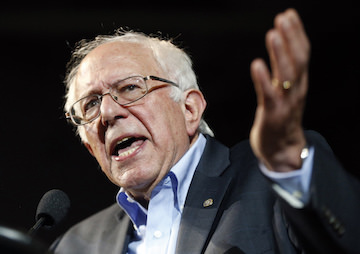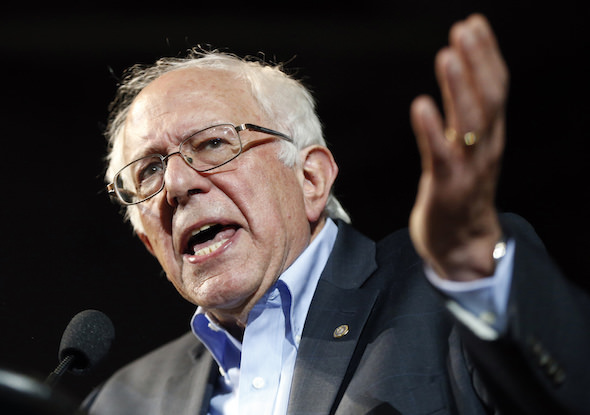The Best Reporting on Bernie Sanders Over the Years
A look back at Bernie Sanders’ career through accountability stories and other in-depth news reports.
By Sarah Smith / ProPublica

Democratic presidential candidate Bernie Sanders. (Robert F. Bukaty / AP)
This piece originally ran on ProPublica.
Bernie Sanders became the first socialist mayor of Burlington, Vermont, and ran successfully as an Independent for the House of Representatives and then the Senate. Now, the Democratic challenger to Hillary Clinton has young voters “feeling the Bern.”
The political career of Bernie Sanders nearly ended before it began. In the early 1970s, he lost his first four races — two for the Senate and two for governor — running on the ticket of Vermont’s radical Liberty Union Party, while espousing positions such as ending the Vietnam War and abolishing the CIA. But when he ran as an Independent for mayor of Burlington in 1981, the socialist Sanders beat the five-term Democratic incumbent.
As mayor, Sanders clashed with Burlington’s Board of Aldermen, which didn’t allow him to hire his own staff and went so far as to fire his secretary. He got a ticket for parking in the mayor’s parking spot. He held meetings in his apartment to avoid eavesdropping. But the 1982 election helped turn the tide towards Sanders, giving him a majority on the board that could sustain a veto (he used it twice in 1982). His supporters eventually coalesced into the Progressive Party, still a Vermont fixture. During his eight years as Burlington mayor, Sanders launched (another) unsuccessful bid for governor in 1986.
Sanders was elected to the House of Representatives by a 17-point margin in 1990, after Vermont Democrats either endorsed him or stepped aside to clear his path. In Washington, Sanders caucused with the Democrats, but didn’t win many friends among them when he called Congress “impotent” and said he wouldn’t mind if 80 percent of its members lost their bids for re-election. He voted against the pro-gun-control Brady bill (which has led to attacks on his record in the 2016 race) and opposed the North American Free Trade Agreement. Sanders led a 2000 effort to allow more imports of low-cost prescription drugs (it was killed by President Bill Clinton) and failed again in 2001.
Rolling Stone dubbed Sanders the House’s “amendment king.” Between 1995 and 2005, no one got more of his or her amendments approved by roll-call vote.
Sanders moved up to the Senate in 2006. In the wake of the financial crisis, he tried to hold up the re-nomination of Federal Reserve Chairman Ben Bernanke in 2009, saying he was “one of the key architects of the Bush economy.” The following year, Sanders got an amendment into the Dodd-Frank financial reform law to audit the loans the Fed made to banks during the emergency. (He had originally supported a proposal by Sen. Rand Paul, R-Kentucky, for a full audit of the Fed, an idea criticized as undermining the central bank’s independence from politics.) Sanders also launched a campaign to improve dental health for the poor.
As chairman of the Senate Veterans Affairs Committee from 2013 to 2015, Sanders was responsible for oversight as the backlog grew for medical appointments at VA hospitals. In response to initial news reports of long wait times in 2014, Sanders said, “There is, right now, as we speak, a concerted effort to undermine the VA.” Critics said he was slow to respond, going on defense because he was blinded by his faith in the agency. Sanders eventually became critical of the VA and supported a damning report by the agency’s inspector general. He worked with Republicans on legislation to fix the crisis. In 2016, he said of his time overseeing the VA: “We should have done better.”
In 2012, Sanders suggested that he’d be open to seeing a primary challenger to Barack Obama to move the president to the left.
The Brooklyn-born Sanders launched his campaign for the Democratic presidential nomination from Burlington in May 2015, joining a small field that was led by Hillary Clinton. He drew young voters with a message focused on income inequality.
Under the scrutiny of the national spotlight, a Politico story found that Sanders’ first son, Levi, was not from his first marriage, as had been previously reported and re-reported, but from a girlfriend Sanders dated between marriages. In December 2015, a data breach allowed the Sanders campaign to see the Clinton campaign’s voter files, so the Democratic National Committee barred Sanders from accessing its voter database. The Sanders campaign fired one of its aides and then sued the DNC to regain access.
Sanders, whose call for free tuition at public colleges is a campaign centerpiece, ran into skepticism about how he would pay for such a program. The Sanders family has experience with the challenges of higher education finances. While Sanders was in Congress, his wife Jane Sanders led Burlington College, a small private liberal arts school in Vermont, from 2004 to 2011. During her tenure, the school spent $10 million on a new campus but couldn’t get enough students or donations to pay back the expansion debt and almost lost its accreditation. Sanders resigned, but neither she nor the board gave specific reasons. In 2015, Burlington College sold all but six of the 33 acres bought when Jane Sanders was in charge.
As the New York Democratic primary approached, Sanders was criticized for stumbling over policy specifics in an interview with the New York Daily News.
ProPublica is a Pulitzer Prize-winning investigative newsroom. Sign up for their newsletter.
Your support matters…Independent journalism is under threat and overshadowed by heavily funded mainstream media.
You can help level the playing field. Become a member.
Your tax-deductible contribution keeps us digging beneath the headlines to give you thought-provoking, investigative reporting and analysis that unearths what's really happening- without compromise.
Give today to support our courageous, independent journalists.






You need to be a supporter to comment.
There are currently no responses to this article.
Be the first to respond.